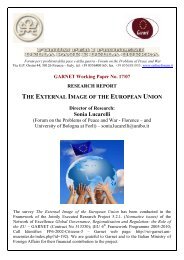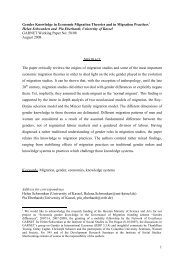GARNET Working Paper No. 13/07
GARNET Working Paper No. 13/07
GARNET Working Paper No. 13/07
You also want an ePaper? Increase the reach of your titles
YUMPU automatically turns print PDFs into web optimized ePapers that Google loves.
To illustrate the diffusive impact of terrorism at the regional level, Drakos and Kutan have<br />
demonstrated with solid quantitative data that a terrorist attack in one state has an impact on<br />
tourism in neighboring states. They fond for instance, that “terrorism in Greece has spill over<br />
effects, exerting a stronger impact on Turkey’s market share” (2003:638).<br />
Regional Provision of Threats and Violence<br />
Although the autonomization of the regional level is generally encouraged by the reception of<br />
threats, regional organizations can themselves be a collective producer of threats. As this<br />
normally presupposes regional concerted ‘actorness’ and, consequently, a significant level of<br />
regional integration, it is not a common feature in global politics. <strong>No</strong>netheless, mainly in the<br />
economic and financial areas, regional organizations can be robust producers of threats. For<br />
example the European Union has produced threats against multinational corporations, mainly<br />
in the area of computer software (e.g. Microsoft). Threats have also been produced against<br />
extra-regional states. In 2000, transatlantic trade frictions between the EU and the US have<br />
deepened after a row over a U.S. tax scheme for exporters. In 2006, the EU has also<br />
threatened to refer India to the World Trade Organization if Delhi did not agree to remove<br />
tariffs on drinks imports.<br />
In another notable example, the Arab League declared war on Israel in 1948 and was directly<br />
involved with the projection of violence to nullify the independence of the state. Furthermore,<br />
the Arab League has imposed an economic boycott to Israel for most of the second half of the<br />
twentieth century. The boycott prohibits direct trade between Israel and the Arab nations and<br />
is also directed at companies that do business with Israel.<br />
***<br />
In all these cases the regional dimension is dominant. Beyond the orthodox cases, amply<br />
stressed by the literature in regional security (where the regional level is explained by the<br />
proximity of threats), this study contends that even when there is a territorial discrepancy<br />
between the producer and receiver of insecurity violence, the regional level may be equally<br />
observable, adding to the inventory of how regions become an autonomous level in peace and<br />
security.<br />
19





